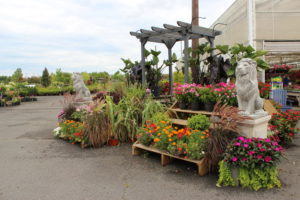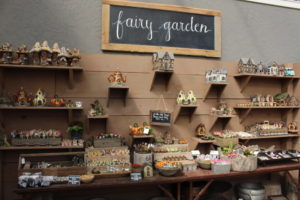
It’s a Two-Way Street
The retail marketplace as we’ve always known it is irreversibly changed, driven by a shift in the consumers’ sensibilities, value perception and expectations.
I’m a firm believer that change can be good, especially when the products and services our industry provides, and our retailers who are the intermediary between our products and the consumer, are positioned to thrive in this new environment … if we recognize and adapt to these dictated changes.
Then and Now…
As we’ve said before, we need to get beyond our traditional transactional or quantitative relationship with our customers, where our goal is to simply sell plants, flowers, accessories and services, to one that is based on experiential, qualitative relationships, where we can truly create those bonds that allow us to fulfill what should be our industry’s mission of enhancing our customers’ quality of life through the use and enjoyment of the products we grow and sell.
Though many believe that this needs to be accomplished through an industry-wide marketing effort, the reality is that that this kind of relationship can only be effectively developed, executed and created on an individual store/ customer basis.
Having a good assortment of quality plants and accessories are the cost of entry into our retail game no matter which venue you look at; this is no longer the major differentiator between the big box stores and locally owned garden centers.
Let’s assume that the retailer has effectively communicated his value statement and provided a memorable shopping experience for their respective customers.
So, what’s that special sauce that makes them loyal to you, bringing them back repeatedly and preaching your praises to their friends (word of mouth peer marketing by happy customers is the most credible advertising you can get)?
We want a customer’s loyalty, but do we offer reciprocal loyalty to our customers? Loyalty is a two- way street; if there isn’t mutual loyalty and respect, you only have a typical buy/sell transactional interaction.
The basis for the relationship successful retailers have with their customers is reciprocal trust and respect. Let me give you two examples of relationships that work, and don’t work, that may help clarify this.
A Phone Example
This past Christmas shopping season, I wanted to buy my daughter and son-in-law new smart phones to replace some aging and less featured phones that they’ve had for years. Their service provider was a national carrier (not naming names, but it’s a six-letter name that starts with an “S” and ends with a “t”), and my daughter was a long-standing customer of over 20 years.
This service provider had been aggressively promoting a buy one phone at regular price/get one phone of similar value for free, along with a very low-cost service plan for new subscribers. So off I go to the S____t store, money in hand to purchase two replacement phones as Christmas gifts, only to find out that this promotion was only available to new subscribers.
OK, I thought, I can kind of sort of understand that they need to offer an amazing offer to get customers to switch carriers in a very saturated market where almost everyone already has a phone carrier. But there must be some kind of comparable deal for existing customers who have been loyal to S____t for all these years.
The response? No deals; pay full retail price for both new phones and no special rates for existing customers. I then asked if I cancel the existing account and signed up as a new customer, could I get the two-fer phones and the low-ball rates? Their response: nope because the billing address would still be the same.
It’s very evident that S____t didn’t respect an existing customer (and some may say they disrespected the existing customer by giving favor to new, unproven customers) who had shown them loyalty for over 20 years. So much for reciprocal loyalty! (P.S. my daughter and son-in-law are in the process of switching to a new carrier).
A Much Better Experience
This was a technology Christmas; I was buying myself a new laptop and two iPad Minis as Christmas gifts. A little background first; earlier in 2018, I purchased
a few new major kitchen appliances from Best Buy because they had the products my wife liked, had an excellent sales associate who got us excited about all of the features/benefits and had timely delivery and installation and competitive pricing (which fit my personal definition of “value”).
Because we dropped some pretty major change there, Best Buy recognized us as Elite Plus members in their proprietary loyalty program.
Like most major retailers this year, Best Buy started promoting their Black Friday ad in late October, with an iPad Mini featured as a front page door buster
at a fantastic price. I planned to join the masses on Thanksgiving night or early Friday morning to get in line to purchase one of the iPad Minis (there was a one unit limit in the ad), something I really wasn’t excited about doing.
Then on Wednesday morning before Thanksgiving, I got an e-mail from Best Buy sent to Elite Plus members explaining that I could purchase any Black Friday ad items online with free delivery and no purchase limits starting on Thursday morning to ensure that all items would be in stock. (And the reward dollars earned on the major appliance purchases could be applied to the iPad purchases too!) Then a week after I received the iPad Minis, I received another e-mail devoted to showing me how to use all of the features of the iPad Mini to make sure I was comfortable using them.
I ordered the laptop from Best Buy online and soon after it was delivered, I received an online download for a free root-kit anti-virus program from Best Buy as an Elite Plus member benefit, as well as a discounted offer for a complete file transfer from my old laptop to the new one.
I think you can see that the Best Buy relationship is definitely reciprocal; I show them loyalty and they in turn provide me with services and benefits in which I derive time and financial value, the basis for a long-term mutually beneficial relationship. It’s very evident that Best Buy understands and focuses on the Customer Lifetime Value (CLV) philosophy we discussed in the January 2019 issue of Lawn & Garden Retailer.
Getting customers in the door once is comparatively easy with a well-timed, well-placed marketing effort; getting them into the store a second and third
time is both our tougher challenge and our biggest opportunity for sales and profit.
Yes, product and services play a part in getting customers to return, but it’s the experiences you provide, the respect and loyalty you commit to and the trust that develops into a two-way relationship that seals the deal.
The two-way street is the road to riches …


















 Videos
Videos





